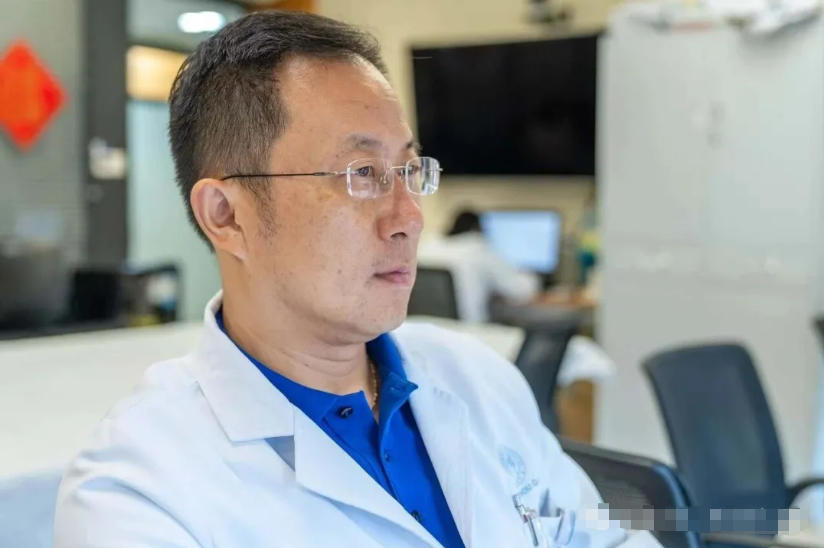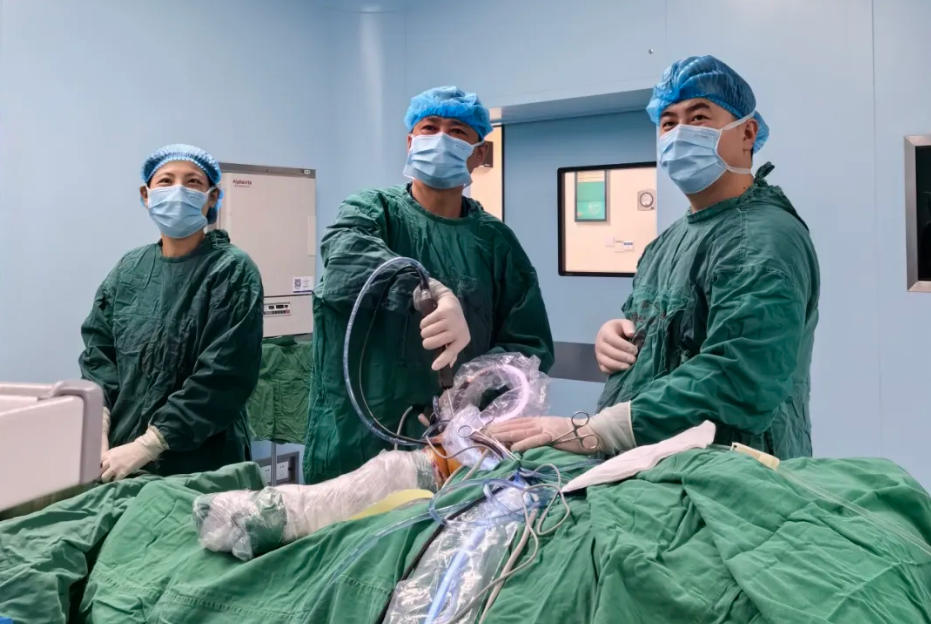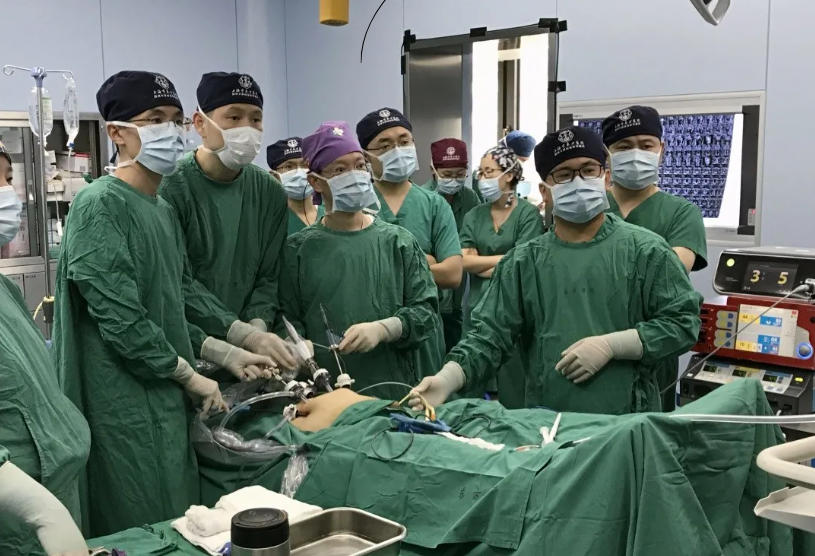Update time:2025-10-18Visits:3018

Wang Liwei, Oncology, Second - class Professor, Director of the Department of Oncology at Renji Hospital, Director of the Pancreatic Cancer Diagnosis and Treatment Center of Shanghai Jiao Tong University
Introduction
Dr. Wang Liwei’s journey from a young chemistry enthusiast to a leading figure in oncology is a story of perseverance and dedication. Over the years, he has elevated the cancer diagnosis and treatment capabilities at Renji Hospital to new heights. He has consistently chosen to tackle the most challenging fields, first specializing in gastric cancer and then focusing on pancreatic cancer. The number of advanced pancreatic tumor patients under his care leads the nation, with some achieving survival rates significantly higher than the national average. Dr. Wang combines profound medical insight with a deep reverence for life, believing that practicing medicine is not just about curing disease, but an expression of humanity and love for life. He has not only healed countless patients but has also provided them with crucial emotional support.
The Path to Medicine
In 1979, at just 15 years old, Wang Liwei took the highly competitive national college entrance exam. Though he had dreamed of becoming a chemist, he was admitted to the School of Medicine at Jiangsu University. While medicine was not his first choice, Wang embraced this unexpected path and gradually developed a passion for it. He studied diligently, laying a solid foundation through relentless effort.
“I was disappointed if I scored below 90 on exams,” Wang recalls. “Classmates asked how I did it. I told them you have to study until you can pinpoint the exact textbook page and line for every question. That’s the result of long-term effort.”
After graduating, Wang was assigned to the People’s Hospital of Yangzhong City. “It was a small hospital, but I saw many patients there, which is where I gained my clinical experience.” Yangzhong City has a high incidence of digestive tract tumors, so Wang immediately focused on their treatment and prevention. From 1987 to 1992, he and his colleagues spent at least half of each year screening the local population, often working without a break until mid-afternoon. In that time, they screened over 30,000 people and identified more than 100 cases of early gastric cancer.
“I once encountered a family where five brothers all developed esophageal cancer,” Wang shared. “Their children were left to rely on each other. Facing that, I felt the cruelty of this disease and knew I had to find a way to cure them.”
Wang spent over a decade at the Yangzhong hospital, earning his master’s and doctoral degrees and advancing rapidly. By 27, he was an attending physician; by 32, an associate chief physician. When he left in 2001 for a visiting professorship in the United States, he was already the director of the local cancer institute, a leading expert in his field, and the hospital’s vice president.
In 2001, Wang was sent to UCLA as a visiting scholar. Six months later, he asked his American mentor to transfer to Texas. The mentor replied, “What’s in that rural city? I’ll only let you go if you’re heading to Houston, to MD Anderson Cancer Center.” Wang smiled; this was the renowned cancer center he had always aspired to join. Coincidentally, the president of the International Gastric Cancer Association was launching a new project, and Wang was the ideal candidate.
MD Anderson, a global leader in cancer treatment and research, is known as the “cradle of oncologists.” There, Wang immersed himself for three years, publishing numerous influential papers on gastric and pancreatic cancer. He was exposed to the latest medical advances and a new philosophy of care.
“I don’t just prescribe a drug; I focus on a comprehensive, long-term survival plan for the patient,” Wang explained. “We call it whole-course management.”
He was deeply inspired by the American model, particularly the emphasis on prevention. “Prevention and management awareness are more important than treatment. Integrating compassionate, humanistic care into both is crucial.”
After three years, Wang had opportunities to stay at MD Anderson or to return to Yangzhong as the hospital director. But he felt a different calling. “I thought, my goal isn’t to be a scholar or a director; it’s to treat more patients. So I decided to go to Shanghai.”
His first stop was Dongfang Hospital, where he spent over three years building a leading oncology center. He then moved to the Department of Oncology at Shanghai First People’s Hospital. After eight years, he transformed the department into one of Shanghai’s five national key clinical specialties for oncology.
In 2010, Wang shifted his focus to pancreatic cancer, the “king of cancers” for its difficulty to detect and treat. He felt compelled to take on this challenge. “Academician Gu Jianren of the Chinese Academy of Sciences told me, ‘We’ve excelled in liver cancer, but pancreatic cancer is a field with many gaps.’ His passion, even in his eighties, moved me.”
Despite the difficulties, Wang devoted his energy to pancreatic cancer. He led national experts to write China’s first “Expert Consensus on Comprehensive Diagnosis and Treatment of Pancreatic Cancer,” filling a critical void in national clinical guidelines.
“As doctors, we cannot fear challenges,” Wang stated. “We must engage with courage in areas that need improvement. Only by advancing research and treatments can we bring more healing opportunities to our patients.”
Leading a Modern Oncology Center
In 2016, Dr. Wang Liwei became the Director of the Department of Oncology at Renji Hospital, a move aimed at advancing his vision for cancer care. Upon his arrival, he established the “Shanghai Eastern Tumor Complex Case Consultation Center” in collaboration with over twenty hospitals in the region. A key focus of the center is “multiple primary tumors,” as Dr. Wang noted that China is entering an era where individuals may develop several distinct types of cancer.
He compares diagnosing a cancer patient to “peeling an onion”: first, determining if the disease is inflammatory or a tumor; second, establishing if it is benign or malignant; and finally, identifying whether it is a primary or metastatic tumor. He believes only by clarifying each layer can a comprehensive management plan be created.
“Many primary tumors are mistakenly treated as metastatic ones,” Dr. Wang explains. “With the correct diagnosis, these patients could achieve far better outcomes.”
At the same time, Dr. Wang champions a holistic approach, blending medical expertise with humanistic care. “What is the point of a successful surgery if the patient ultimately passes away?” he asks. He stresses that successful treatment requires a doctor who understands the patient, the patient’s active cooperation, and a strong support system from family and society. He builds trust through constant communication, ensuring patients feel supported throughout their treatment.
Since 2016, the department has made remarkable strides. In talent development, it has grown from having just one researcher to boasting four senior experts and twelve associate senior experts. The proportion of doctors with doctoral degrees has surged from 20-30% to over 90%.
In terms of research funding, the department now secures an average of 3 to 5 grants annually from the prestigious National Natural Science Foundation of China (NSFC). Over 80% of the doctors in the department lead NSFC projects, with a success rate that exceeds some dedicated research institutions. One director simultaneously manages seven national-level projects.
The department is also deeply committed to clinical research. Recognizing its importance, the department now encourages nearly 50% of its patients to participate in clinical trials, providing them with access to cutting-edge treatments while contributing valuable data to the field of oncology.
This progress is matched by excellence in clinical practice. The department integrates research with patient care to create personalized treatment plans. It has also fostered a culture of academic exchange by participating in international conferences and hosting experts from around the world.
Innovating in medical education, Dr. Wang established a clinical oncology course at Shanghai Jiao Tong University School of Medicine. The course became so popular that students successfully petitioned for it to become a required elective, ensuring future doctors are equipped with foundational knowledge in this critical field.

A Multidisciplinary Model for Cancer Care
Every day at 7 AM, the multidisciplinary team (MDT) consultations at Renji Hospital’s Cancer Center draw a crowd of doctors and patients. This collaborative approach improves diagnostic and treatment capabilities by bringing together experts from various disciplines to discuss complex cases and develop the most effective treatment plans. This one-stop model is a major convenience for patients, who can see specialists from medical, surgical, and radiation oncology in a single visit.
“The implementation of this MDT model has increased our outpatient volume by 50-70%,” Dr. Wang notes. “Patients find it incredibly convenient, which validates our approach.”
The center operates on a Comprehensive Cancer Center (CCC) model, benchmarked against the standards of Germany’s German Cancer Society (DKG). Studies have shown that patient outcomes are significantly better at DKG-certified centers. To adopt this model, Renji Hospital sent several teams of experts and administrators to Germany for training.
The CCC model requires related disciplines to form cooperative networks, including not just diagnostic and treatment departments, but also rehabilitation, nursing, psychology, nutrition, and palliative care. Through MDT discussions, standardized treatment plans are created for patients at critical points in their care.
The model also establishes patient management teams to provide seamless, integrated support throughout the entire treatment cycle. Quality is continuously monitored through review meetings, and improvement plans are implemented to enhance overall care. Furthermore, the model mandates continuing education for all medical staff and emphasizes the importance of clinical research and patient follow-up.
Based on this framework, the center has launched 10 specialized joint outpatient clinics. Patients can receive diagnoses and consultations from multiple disciplines on one platform without navigating different departments. This has greatly improved efficiency, allowing patients to get tests and results faster.
Dr. Wang attributes the center’s success to the forward-thinking support of the hospital’s leadership, including Hospital President and Academician Xia Qiang, and Party Secretary and Professor Zheng Junhua. Their focus on multidisciplinary integration and a culture of innovation has been instrumental.
A New Era of Regional Collaboration
In recent years, the Cancer Center at Renji Hospital has played a pivotal role in the integration of the Yangtze River Delta region. Dr. Wang successfully developed the center into a key clinical discipline in Shanghai and a National Regional Medical Center. He also spearheaded the creation of the Yangtze River Delta Oncology Specialist Alliance, a network of 141 hospitals from over 120 cities. The alliance’s mission is to standardize cancer diagnosis and treatment and promote homogenization in talent development across the region.
To guide this effort, the center has established “Four Modernizations” as its goals: standardization, homogenization of care, internationalization, and the adoption of intelligent (smart) technologies. To promote these goals, the center holds four annual forums, one in each province of the Yangtze River Delta. Dr. Wang hopes this collaborative model can become a blueprint for the rest of China.
The center also extends its expertise to less economically developed regions, implementing comprehensive systems for academic education, talent development, and research training to elevate their standard of care.
Community engagement is another key pillar. Through regular health lectures and free clinic events, the team raises public awareness about cancer prevention and early detection, working to reduce cancer incidence and mortality rates.
The journey for the Renji Hospital Cancer Center is ongoing. Dr. Wang plans to lead his team in tackling new challenges, further strengthening the center’s role as a leader in oncology.

Editor: Chen Qing @ ShanghaiDoctor.cn
If you'd like to contact Doctor Li, please be free to let us know at chenqing@ShanghaiDoctor.cn.
Note: Chinese Sources from “The Path of Benevolent Medicine” which was published in 2024. It records 90 important medical figures in the history of Renji Hospital. Yewen Renyi (ShanghaiDoctor.cn) team was one of the major writers of the book and is authorized by Renji hospital to create English version on the website of ShanghaiDoctor.cn
Hospital: Renji Hospital, Shanghai Jiao Tong University School of Medicine
Dr. Zhou Qianjun | “Sculpting Life in the Chest” – A Portrait” – A Portrait
Dr. Cai Junfeng | Guarding Bone and Joint Health, Improving Quality of Life
Dr. Xu Xiaosheng|The Gentle Resilience of a Male Gynecologist
Dr. Shi Hongyu | A Cardiologist with Precision and Compassion
Dr. Zhang Guiyun|The Inspiring Path of a Lifesaving Physician
Dr. Chen Bin | Building the Future of ENT Surgery at Lingang,Shanghai
Prof. Zhang Baigen | The Oral History of China’s Vascular Surgery

Dr. Zhou Qianjun | “Sculpting Life in the Chest” – A Portrait” – A Portrait

Dr. Cai Junfeng | Guarding Bone and Joint Health, Improving Quality of Life

Dr. Cui Xingang | The Medical Dream of a Shanghai Urologist

Dr. Xu Xiaosheng|The Gentle Resilience of a Male Gynecologist

Dr. Shi Hongyu | A Cardiologist with Precision and Compassion

Dr. Zhang Guiyun|The Inspiring Path of a Lifesaving Physician

Dr. Jiang Hong | Bringing Hope to Vascular Frontiers

Dr. Huang Jia | A Journey of Healing "Breath"

Dr. Chen Bin | Building the Future of ENT Surgery at Lingang,Shanghai

Prof. Zhang Baigen | The Oral History of China’s Vascular Surgery